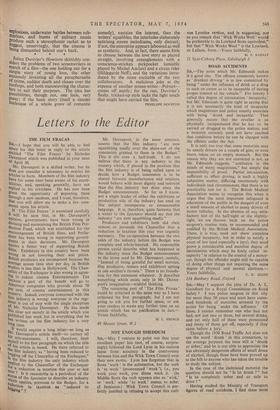SIR,—May 1 support the plea of Dr. A. L, Goodhart
for a Royal Commission on-Road Safety ? I was police surgeon in this city for more than 30 years and must have exam- ined hundreds of motorists arrested by the police for being under the influence.' Of these, 1 cannot remember one who had not had, not just two or three, but several drinks, and yet only half of them were prosecuted and many of those got off, especially if they came before a jury.
Though the 1930 Road Traffic Act does not use the word `drunk' in this connection, to the average juryman the issue still is drunk or sober,' and he is not able to appreciate the less obviously dangerous effects of small doses of alcohol, though these have been proved up to the hilt to anyone who has taken the trouble to study the subject.
In the case of the inebriated motorist the question should not be " Is he drunk ? " but " Is he completely sober and so safe to drive ? "
Having studied the Ministry of Transport figures of road accidents, I find these most misleading and no real guide to the number of accidents attributable to alcohol. The Ministry report fox 1952, on page 56, which refers to accidents due to the drivers of the vehicles involved, states that only 870 were attributed by the police to alcoholism out of a total of 114,409. 1 contend that this figure is most misleading and bears little relation to the facts.. On the same page of the report there is a long list of other causes of acci- dents, for instance, overtaking, cutting-in, speeding, misjudging clearance, distance or speed. Any of these certainly might be, and in my opinion very often is, the direct result of, slight alcoholic intoxication not detected by the ordinary tests available at the police station but easily detected by more scientific methods. In the Report of the Royal Society for the Prevention of Accidents a similar list of causes of accidents is given without em- phasising the point that alcohol might be a factor at the back of most of these so-called ' causes.'
The Swedish Government has recently car- ried out exhaustive tests under road traffic conditions on 3,000 motorists, and issued a 300-page report of which I have only seen the summary. This indicates that a very small percentage of alcohol in the blood will cause the accident rate to rise, and that when the blood contains If parts of alcohol per thou- sand (which would not be thought high in this country) the chances of an accident are 30 times as great as with a sober driver.
Somewhat similar tests are now being car- ried out in this country. A committee of the British Medical Association is responsible for these, but it will be some time before a report is issued.
Road defects in my opinion are not the main cause of accidents. I have recently seen a report from Detroit, where over 20 persons per month are killed on the roads: No doubt the traffic is thicker there, but road defects are not mentioned. (Leicester, with one-third of the population, has, roughly, one fatal road accident per month.) in any case, the worse the roads, the more necessary it is for the drivers to be alert and careful, In fairness to the motorists it should not be overlooked that inebriated cyclists and pedestrians account for a moderate proportion of accidents. The large number of cars which are parked for long periods outside hotels and public houses strongly suggests that many of their owners are not at their best on leaving, and it is silly to suppose that a man who has been in a bar for three to four hours has only had one or two drinks.
Finally, a word about freedom. The man who has been brought to the police station, stripped of his money and other chattels, and locked up in a cell for some hours, has surely had his fteedom drastically restricted, and that on suspicion only, in the interests of public safety. If he is required to furnish a few drops of blood or a sample of urine for analysis, the slight further infringement of his liberty should be tolerated as being also in the public interest.—Yours faithfully,
156 London Road, Leicester N. I. SPRIGGS











































 Previous page
Previous page